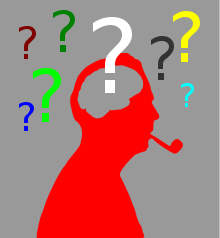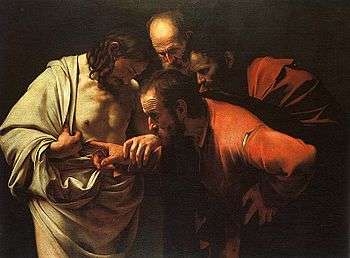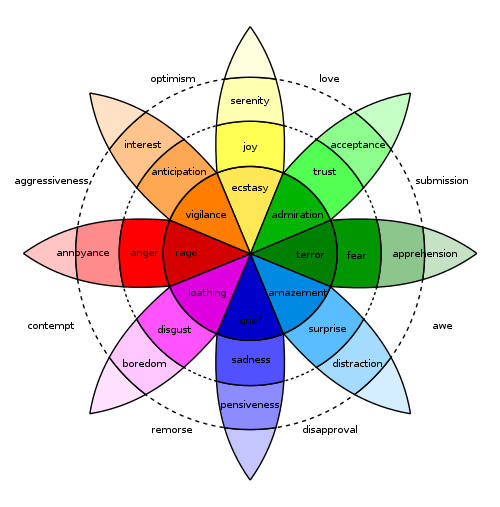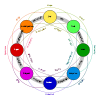Doubt
Doubt is a mental state in which the mind remains suspended between two or more contradictory propositions, unable to be to be certain of any of them.[1] Doubt on an emotional level is indecision between belief and disbelief. It may involve uncertainty, distrust or lack of conviction on certain facts, actions, motives, or decisions. Doubt can result in delaying or rejecting relevant action out of concern for mistakes or missed opportunities.

Definition
The concept of doubt as a suspense between two contradictory propositions covers a range of phenomena: on a level of the mind it involves reasoning, examination of facts and evidence and on an emotional level believing and disbelieving
In premodern theology doubt was "the voice of an uncertain conscience" and important to realize, because when in doubt "the safer way is not to act at all".
Society
Doubt sometimes tends to call on reason. Doubt may encourage people to hesitate before acting, and/or to apply more rigorous methods. Doubt may have particular importance as leading towards disbelief or non-acceptance.
Politics, ethics and law, with decisions that often determine the course of individual life, place great importance on doubt, and often foster elaborate adversarial processes to carefully sort through all available evidence.
Societally, doubt creates an atmosphere of distrust, being accusatory in nature and de facto alleging either foolishness or deceit on the part of another. Such a stance has been fostered in Western European society since the Enlightenment, in opposition to tradition and authority.
Psychology
Sigmund Freud's psychoanalytic theory attributes doubt (which may be interpreted as a symptom of a phobia emanating from the ego) to childhood, when the ego develops. Childhood experiences, these theories maintain, can plant doubt about one's abilities and even about one's very identity.
Cognitive mental as well as more spiritual approaches abound in response to the wide variety of potential causes for doubt. Behavioral therapy — in which a person systematically asks his own mind if the doubt has any real basis — uses rational, Socratic methods. This method contrasts to those of say, the Buddhist faith, which involve a more esoteric approach to doubt and inaction. Buddhism sees doubt as a negative attachment to one's perceived past and future. To let go of the personal history of one's life (affirming this release every day in meditation) plays a central role in releasing the doubts — developed in and attached to — that history.
Partial or intermittent negative reinforcement can create an effective climate of fear and doubt.[2]
Philosophy
Descartes employed Cartesian doubt as a pre-eminent methodological tool in his fundamental philosophical investigations. Branches of philosophy like logic devote much effort to distinguish the dubious, the probable and the certain. Much of illogic rests on dubious assumptions, dubious data or dubious conclusions, with rhetoric, whitewashing, and deception playing their accustomed roles.
Theology
Doubt that god(s) exist may form the basis of agnosticism — the belief that one cannot determine the existence or non-existence of god(s). It may also form other brands of skepticism, such as Pyrrhonism, which do not take a positive stance in regard to the existence of god(s), but remain negative. Alternatively, doubt over the existence of god(s) may lead to acceptance of a particular religion: compare Pascal's Wager. Doubt of a specific theology, scriptural or deistic, may bring into question the truth of that theology's set of beliefs. On the other hand, doubt as to some doctrines but acceptance of others may lead to the growth of heresy and/or the splitting off of sects or groups of thought. Thus proto-Protestants doubted papal authority, and substituted alternative methods of governance in their new (but still recognizably similar) churches.
Christianity often debates doubt in the contexts of salvation and eventual redemption in an afterlife. This issue has become particularly important in Protestantism, which requires only the acceptance of Jesus, though more contemporary versions have arisen within the Protestant churches that resemble Catholicism.

Doubt as a path towards (deeper) belief lies at the heart of the story of Saint Thomas the Apostle. Note in this respect the theological views of Georg Hermes:
... the starting-point and chief principle of every science, and hence of theology also, is not only methodical doubt, but positive doubt. One can believe only what one has perceived to be true from reasonable grounds, and consequently one must have the courage to continue doubting until one has found reliable grounds to satisfy the reason.[3]
Christian existentialists such as Søren Kierkegaard suggest that for one to truly have belief in God, one would also have to doubt one's beliefs about God; the doubt is the rational part of a person's thought involved in weighing evidence, without which the belief would have no real substance. Belief is not a decision based on evidence that, say, certain beliefs about God are true or a certain person is worthy of love. No such evidence could ever be enough to pragmatically justify the kind of total commitment involved in true theological belief or romantic love. Belief involves making that commitment anyway. Kierkegaard thought that to have belief is at the same time to have doubt.[4][5]
Law
Most criminal cases within an adversarial system require that the prosecution proves its contentions beyond a reasonable doubt — a doctrine also called the "burden of proof". This means that the State must present propositions which preclude "reasonable doubt" in the mind of a reasonable person as to the guilt of defendant. Some doubt may persist, but only to the extent that it would not affect a "reasonable person's" belief in the defendant's guilt. If the doubt raised does affect a "reasonable person's" belief, the jury is not satisfied beyond a "reasonable doubt". The jurisprudence of the applicable jurisdiction usually defines the precise meaning of words such as "reasonable" and "doubt" for such purposes.
Science
To doubt everything or to believe everything are two equally convenient solutions; both dispense with the necessity of reflection.
—Henri Poincaré, Science and Hypothesis (1905) (from Dover abridged edition of 1952)
The scientific method regularly quantifies doubt, and uses it to determine whether further research is needed. Isaac Asimov, in his essay collection Fact and Fancy, described science as a system for causing and resolving intelligent doubt.[6]
See also
- Doubting Thomas
- Fear, uncertainty and doubt
- Further research is needed
- List of ethics topics
- Methodic doubt
- Philosophical skepticism
- Question
- Reasonable doubt
- Skepticism
- Self-doubt
Notes and references
| Wikiquote has quotations related to: Doubt |
| Look up doubt or dubious in Wiktionary, the free dictionary. |
| Wikimedia Commons has media related to Doubt. |
- Sharpe, Alfred. "Doubt". The Catholic Encyclopedia. Vol. 5. New York: Robert Appleton. Retrieved 2008-10-21.
A state in which the mind is suspended between two contradictory propositions and unable to assent to either of them.
- Braiker, Harriet B. (2004). Who's Pulling Your Strings ? How to Break The Cycle of Manipulation. ISBN 0-07-144672-9.
- Schulte, Karl Joseph (1910). "George Hermes". The Catholic Encyclopedia. 7. New York: Robert Appleton. Retrieved 2008-10-21.
- Concluding Unscientific Postscript to Philosophical Fragments, ed. by Howard V. Hong and Edna H. Hong, v. 1, Princeton University Press, 1992, pp. 21–57
- Soren Kierkegaard's Journals and Papers, trans. Hong and Malantschuk, p. 399.
- "Archived copy". Archived from the original on 2017-06-25. Retrieved 2017-10-09.CS1 maint: archived copy as title (link)
Further reading
- Berger, Peter L. and Zijderveld, Anton (2009). In Praise of Doubt: How to Have Convictions Without Becoming a Fanatic. New York: HarperOne. ISBN 978-0-06-177816-2. A book by two eminent sociologists, one American and the other Dutch.
- Hecht, Jennifer Michael (2003). Doubt: a history: the great doubters and their legacy of innovation from Socrates and Jesus to Thomas Jefferson and Emily Dickinson. San Francisco: HarperSanFrancisco. ISBN 0-06-009795-7. This book traces the role of doubt through human history, all over the world, particularly regarding religion.
- Hein, David (Winter 2006). "Faith and Doubt in Rose Macaulay's The Towers of Trebizond". Anglican Theological Review 88 (1): 47–68. ISSN 0003-3286.


